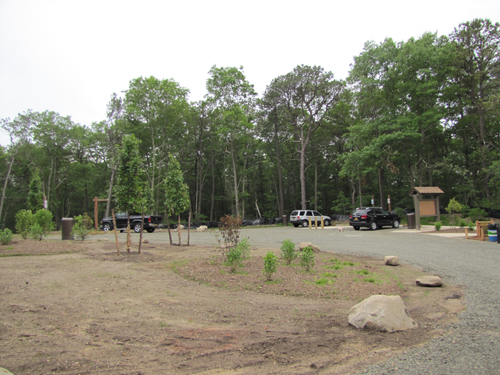Did the DEC violate its own state laws in the Pine Barrens?

Normally, the state Department of Environmental Conservation is the entity saying that a developer or municipality is in violation of state environmental regulations.
But now, officials from Brookhaven Town are claiming the DEC violated its own regulations by more than tripling the size of a DEC boat launching site in Calverton, a site that’s located the core preservation area of the Pine Barrens, where development is greatly restricted.
Development in the Pine Barrens core must obtain a waiver from the Central Pine Barrens Joint Planning and Policy Commission if it is to be permitted, and officials say the DEC never even applied for permission in this case. The DEC’s former regional director was a member of that commission until he recently left his role to take a job with Suffolk County.
John Turner, the open space program coordinator in Brookhaven Town’s Division of Land Management, says the DEC began work on the expansion in December of 2014 and in doing so, cleared more than 21,000 square feet of trees — about a half acre — in violation of the state’s 1993 Pine Barrens Act, which restricts development in the Central Pine Barrens, which covers parts of Brookhaven, Riverhead and Southampton Towns.
State DEC Commissioner Joseph Martens announced earlier this month that the $462,000 improvement project at the Forge Pond Fishing Access site off South River Road was complete, and that the upgrades included parking and safety improvements, as well the installation of a concrete ramp for launching trailered boats and an accessible dock for launching canoes and kayaks.
“The new ramp and parking spots will allow individuals with mobility impairments to get out and enjoy this natural area,” Mr. Martens said in a press release.
The project was funded by the state’s Environmental Protection Fund, he said.
Mr. Turner, speaking at Wednesday’ meeting of the Pine Barrens Commission — which is comprised of representatives of the state, Suffolk County and the three towns in the Central Pine Barrens area — said the impacts of the expansion include “the complete destruction of approximately one half acre of Pine Barrens forest, causing the general loss of wildlife habitat, including endangered species habitat.”
He is asking the Pine Barrens Commission to investigate the situation and provide a legal opinion on whether they feel the expansion is in violation of the Pine Barrens Act.
A DATED GOOGLE STREET VIEW IMAGE OF THE DEC BOAT RAMP ON S. RIVER RD.
“This section of Peconic Lake (also known as Forge Pond) only allows boats with electric motors, which are smaller boats,” Brookhaven Town Supervisor Ed Romaine said. “That’s the thing that struck me. Why are they building such a huge boat ramp when most electric boats are smaller than gas powered boats?”
“We’re concerned about the potential precedent-setting nature of this,” said Richard Amper, executive director of the Long Island Pine Barrens Society, a nonprofit environmental organization not connected to the Pine Barrens Commission.
“It’s pretty scary if anybody on this commission can simply self-certify that a project they are interested in doesn’t constitute development and therefore doesn’t come before this commission,” Mr. Amper said. “I think it’s very dangerous.”
He suggested the commission meet with its attorney, John Milazzo, and determine if the DEC’s actions were in violation of the law and what steps to take.
Normally, the Pine Barrens Commission has a state representative — usually the regional director of the DEC. However, former regional director Peter Scully recently resigned that post to take a job with the county, and there was no state representative at Wednesday’s Pine Barrens Commission meeting. Mr. Scully had been chairman of the commission before his resignation.
Prior to this year, the Forge Pond boat launch area contained a dirt parking lot with a light surface cover of gravel on a 9,500 square foot parking lot, according to Mr. Turner.
The expansion involved the clearing of about 21,522 square feet of additional property, he said. The Pine Barrens Act prohibits development in the core area without approval from the commission, and it defines what it considers development.
The law specifically cites “a material increase in the intensity of use of land” and specifies “commencement of mining, excavating or material alteration of grade or vegetation on a parcel of land,” as examples of what it considers development.
It also specifies “material alteration of a shore, bank or flood plain” of a water body as being development.
The DEC has maintained that the expansion didn’t count as “development” under the Pine Barrens Act, citing a section of the act that allows for “public improvements undertaken for the health, safety, or welfare of the public,” and a section that allows “existing or expanded recreational use consistent with the purposes” of the Pine Barrens Act.
The Pine Barrens Commission went into a closed, executive session meeting after Wednesday’s public meeting to discuss the issue with their attorneys, but did not take any formal action afterwards.
Officials from the DEC have not immediately returned requests for comments on this issue.







